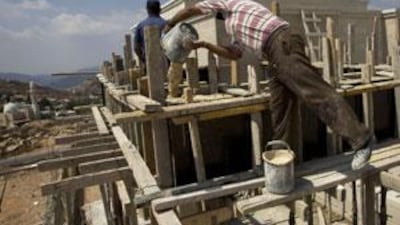TEL AVIV // George Mitchell, the top US envoy to the Middle East, will begin a series of meetings with senior Israeli officials today in an effort to finalise a deal on a temporary freeze of Jewish settlement expansion in occupied Palestinian territory.
Mr Mitchell, who was due to arrive in Israel last night, is expected to meet Ehud Barak, Israel's defence minister, today and Benjamin Netanyahu, the country's prime minister, tomorrow. Mr Mitchell's stay in the region will also include visits to the Palestinian territories, Jordan, Lebanon and Egypt. The US emissary is trying to push Israel to commit to a construction lull in the occupied West Bank. According to press reports, the halt may last for nine months, a compromise between Israel's insistence on only six months and the US demand to execute it for at least one year. Israel is also demanding that the freeze only affect housing units while allowing work on such public buildings as schools, health clinics and synagogues .
The pact is also unlikely to include East Jerusalem, where Mr Netanyahu has held firm that Israel will continue allowing Jewish construction to carry on. Washington is racing to clinch a settlements agreement before the UN General Assembly in September, when Barack Obama, the US president, may present a long-awaited Middle East peace plan. Mr Obama is aiming to arrange for a meeting between Mr Netanyahu and Mahmoud Abbas, the president of the western-backed Palestinian Authority, on the sidelines of the UN General Assembly, as a way to kick start peace negotiations that have stalled since Israel's onslaught on the Gaza Strip in December and January. The two have not met since Mr Netanyahu became prime minister in March.
However, whether such a meeting would take place appears uncertain. Mr Abbas refuses to convene with Mr Netanyahu until Israel institutes a total freeze on settlements in territory Palestinians want as part of their future state. Mr Abbas is believed to have been especially angered by Israel's announcement last week that it has approved the building of 455 new apartments for Jewish settlers in the West Bank. Analysts have said that the approvals were probably an attempt by Mr Netanyahu to soften opposition to a temporary settlement freeze within his right-wing Likud Party and from the hardline parties in his governing coalition.
Such a freeze still appears to be a hard sell for Mr Netanyahu, who was hoping to cushion the agreement with gestures from Arab countries towards normalising ties with Israel. On Thursday, the Israeli leader expressed disappointment with the gestures Washington was able to extract from Arab states, telling Miguel Moratinos, the Spanish foreign minister, who was visiting Israel, that so far it was not more than a "slim normalisation package" that included a number of gestures from some Gulf countries. He especially cited Saudi Arabia's refusal to make any overtures towards Israel.
Mr Mitchell's visit to Israel coincides with Mr Netanyahu's visit today to Cairo, where he is due to meet Hosni Mubarak, the Egyptian president, for the second time since coming to power. Although the two leaders are likely to discuss the peace process and a possible prisoner exchange between Israel and Hamas, the visit may also signal Mr Mubarak's support for an Israeli-US compromise on the settlements. Israeli media also reported that Mr Netanyahu will ask the Egyptian president to press Mr Abbas to attend the planned tripartite meeting in New York this month.
Even if a suspension is implemented, experts say it will probably not significantly halt the growth of Jewish settlements. According to Amos Harel, a commentator for Haaretz, a liberal Israeli newspaper, construction will mostly be stopped in the large settlement blocs that Israel intends to keep under any future agreement with the Palestinians. Harel said enforcing the freeze would be much more difficult on the eastern side of the separation barrier and along the West Bank, where the more extremist settlers have for years been creating wildcat outposts without state authorisation, many of them on private Palestinian land.
Mr Netanyahu's commitment to a construction lull is also questionable as he seeks to cater to the interests of the settlers and their supporters, who helped him return to the premiership for the second time after February's national elections. On Thursday, Mr Netanyahu, speaking at Likud's Tel Aviv headquarters, appeared to direct his speech at the members of the Right who have accused him of caving in to the US demands when he said: "We have proved time and again that we are willing to make concessions for peace, but we won't delude ourselves: we are not willing to be suckers."

